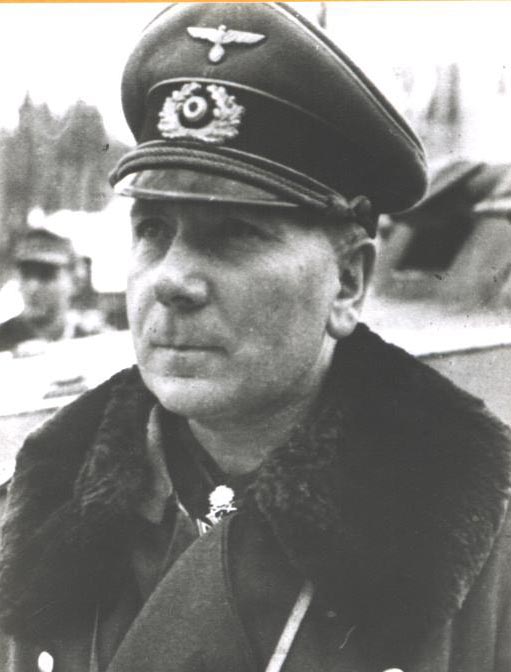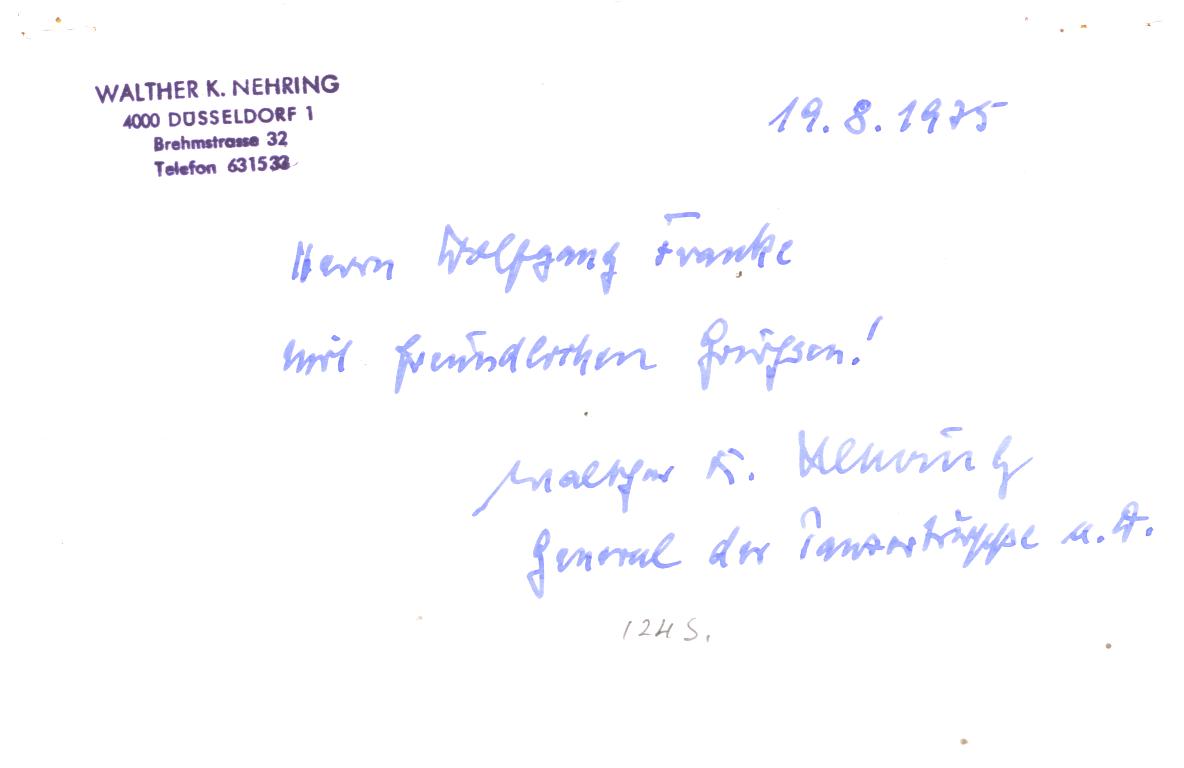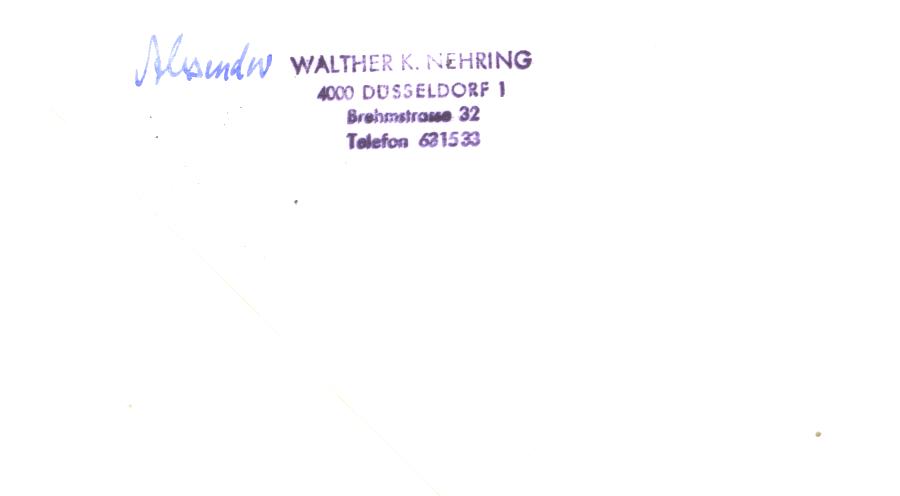


|
~SOLD~ NEHRING Walter
General der Panzertruppe
Nehring, Walter K.
* 15.08.1892 Stretzin, Krs Schlochau
+ 20.04.1983 Düsseldorf
Awarded Knights Cross: 24.07.1941 as: Generalmajor Funktion: Kommandeur 18.PzDiv
Awarded Oakleaves as the 383rd Recipient : 08.02.1944 as General der Panzertruppe Kommandierender General XXIV.Armeekorps
Awarded Swords as the 124th Recipient 22.01.1945 as General der Panzertruppe Kommandierender General XXIV.Armeeko
Walther K. Nehring (1892-1983) was a German general who served in Poland, France and North Africa, but who spent the most time serving on the Eastern Front.
Nehring joined the German Army on 16 September 1911 as an officer candidate with Infantry Regiment 152. He was promoted to Leutnant on 18 December 1913, and to Oberleutnant during the First World War. Two days after that promotion he was awarded the Iron Cross First Class (he also received the Iron Cross Second Class and the Wound Badge in Black).
After the war Nehring joined the Reichswehr, the 100,000 strong army of the Weimar Republic. In 1923 he was promoted to Hauptmann and given command of a machine gun company in Infantry Regiment 2. He was then selected for general staff training. The German General Staff had been banned by the Treaty of Versailles, but this was easily bypassed, and the Truppenamt of the Reichswehr Ministry fulled the same role. In March 1937 Nehring was promoted to Oberst, and in October 1937 he was given command of Panzer Regiment 5.
In July 1939 Nehring was appointed to the staff of XIX Corps, and by the start of the Second World War he was serving as the corps' chief of staff (under General Guderian). Nehring served in the post during the campaigns in Poland in 1939 and France in 1940. He was then promoted to Generalmajor (1 August 1940) and given command of the newly formed 18 Panzer Division (25 October 1940).
The connection to Guderian remained, and Nehring's division formed part of Panzer Group Guderian during Operation Barbarossa. Nehring was awarded the Knight's Cross on 24 July 1941 for actions around Borissow and the Beresina River.
1942 saw a major change of scene for Nehring. At the end of January he was transferred to North Africa. On 1 February he was promoted to Generalleutnant. On 29 May 1942 General Cruewell, the command of the Africa Corps (Rommel having been promoted to command the larger Axis army in North Africa) was captured by the British, and Nehring replaced him.
Nehring took command of the Africa Corps in time to take command during the assault on the Gazala Line in May 1942. His command carried out the key movement around the southern flank of the defensive line, crippled the Allied armour and forced them to retreat back towards El Alamein. Nehring was promoted to General der Panzertruppe on 1 July 1942.
Nehring's men played the main part in Rommel's final major offensive in the Western Desert, the battle of Alam Halfa (31 August-7 September 1942). Nehring himself was wounded while crossing a British minefield on the first day of the battle, but remained in command. He was wounded again in an air attack in September, and was forced to return to Germany to recover.
He was thus absent when the Allies landing in North Africa (Operation Torch, 8 November 1942). Kesselring responded to the invasion by appointing Nehring to command a new formation in Tunisia (90th Corps, then V Panzerarmee). When Nehring arrived Tunisia seemed to be open to the Allies, but he was able to organise a successful defensive of the country's long western border, giving the Germans time to flood reinforcements into the area. His first major success came on 19 November 1942, when he expelled the French from Medjez-el-Bab, a key transport link thirty miles to the west of Tunis. Nehring soon abandoned this advanced position, and the Allies advanced to within twelve miles of Tunis. Nehring waited until the 10th Panzer Division had arrived and then launched a counterattack that ended the first Allied offensive in Tunisia and greatly extended the war in North Africa. Despite this success, Nehring was judged to be too pessimist for the command in North Africa, and on 5 December 1942 was replaced by General von Arnim.
Nehring returned to the Eastern Front, where he was appointed commander of the 24th Panzer Corps (a post he held from 10 February 1943 to 27 June 1944 and again from 20 August 1944-20 March 1945). The gap in the summer of 1944 came when he was appointed to temporary command of the 4th Panzer Army (before the arrival of its new commander, General Hermann Balck), followed by a short spell as commander of the 48th Panzer Corps.
Nehring was awarded the Oakleaves to the Knights Cross on 8 February 1944, during his first period in command of 24th Panzer Corps, and the Swords to the Knight's Cross on 22 January 1945, towards the end of his second spell in command. During this period Nehring was involved in the defensive battles on the southern part of the Eastern Front, before being pushed back into southern Poland. The remnants of his corps, by then known as Gruppe Nehring, was pushed back into Silesia in March 145.
On 20 March 1945 Nehring was appointed commander of the 1st Panzer Army (replacing General Heinrici). This was a short-lived appointment, and by the end of March Nehring was replaced by General Hasse. The army itself was disbanded on 3 April. Nehring retreated west, and surrendered to the Americans on 9 May 1945. He was held as a prisoner of war for three years, and survived for nearly forty years after the war, dying in Dusseldorf in 1983.
Rickard, J (28 October 2011), Walther K. Nehring, 1892-1983 , http://www.historyofwar.org/articles/people_nehring_walther.html
Signed note mailing envelope and unsigned photo
Price: $0.00
Please contact us before ordering to confirm availability and shipping costs.
Buy now with your credit card
other ways to buy
|


